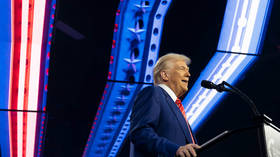Tehran OKs uranium exchange plan
Iran has agreed to a plan to export its reserves of enriched uranium to have them processed into nuclear fuel rods, but it wants further negotiations over some details.
The news comes from Iranian President Mahmoud Ahmadinejad, who was speaking on Thursday on national TV.
“We welcome the fuel exchange, nuclear cooperation, building of power plants and reactors and we are ready to cooperate,” he said.
He added that Tehran’s commitment to the deal is a response to the international community’s abandoning of the “politics of confrontation” over Iran’s nuclear dossier.However, once again, Ahmadinejad said the Islamic Republic will not give up its rights to have nuclear power. “As long as this government is in power, it will not retreat one iota on the undeniable rights of the Iranian nation,” the Iranian president declared.
Iranian negotiator Ali Asghar Soltanieh has delivered Tehran’s response to the International Atomic Energy Agency (IAEA) head Mohamed ElBaradei in Vienna. He also announced that some “important technical and economic amendments” to the draft agreement have been proposed by Iran. However, no further details have been made public yet.
According to Iranian media reports, Tehran will want two changes to the initial plan. Firstly, the Iranians will offer to transfer their low-enriched uranium abroad in small portions rather than all at once. The second modification would insist on transferring enriched fuel back to Tehran’s research reactor soon after every batch of low-enriched uranium is sent abroad.
The question is whether the international community and the IAEA would agree to such amendments.
According to the initial deal – which was sponsored by the IAEA and negotiated between Iran, Russia, France and the United States last week – most of Iran’s stock of low-enriched uranium will be shipped to Russia for further enrichment. France will then produce fuel rods from the material, using American technology.
Iran needs fuel rods to run a research reactor built in the country before the Islamic Revolution. Its current fuel load will soon run low.
“The delay may have been caused by the fact that this is really the first time that Iran and the so-called 5+1 countries are cooperating in the nuclear sphere,” said political analyst Amir Musavi. “This is a big step forward after we heard threats of the suspension of any kind of talks on the issue.”
The 5+1 group – which consists of China, France, Russia, the United States, Great Britain and Germany – have been the main players at the negotiating table, with the IAEA being their main tool in reaching a peaceful solution.
“If Iran really wants not just a peaceful nuclear program, but wants to reach a certain level of enrichment after which the production of nuclear weapons will be just a matter of technique, a matter of months or weeks, then this situation really rejects Iran from that opportunity,” said Dmitry Suslov from the Council on Foreign and Defense Policy.
Meanwhile, the IAEA monitors returned Thursday after visiting Iran’s recently revealed uranium enrichment facility, known as Fordo, near the town of Qom. The inspectors are now preparing a report on their findings which will be announced in November. The fact that the Iranians did let the inspectors into the facility, which was kept secret up until September 21, is seen as Tehran’s readiness to cooperate.
Thursday’s news relaxes tension over Iran’s nuclear program. Tehran has insisted that it is purely for peaceful purposes, but several countries including Israel, the United States and Great Britain suspect that Iran wants to make a nuclear weapon.
Western powers have called for imposing harsher sanctions against the Islamic Republic and there have even been speculations of a possibility of Israel launching a preemptive strike against Iran. Russia, however, has insisted on a diplomatic approach to the problem and negotiations.












